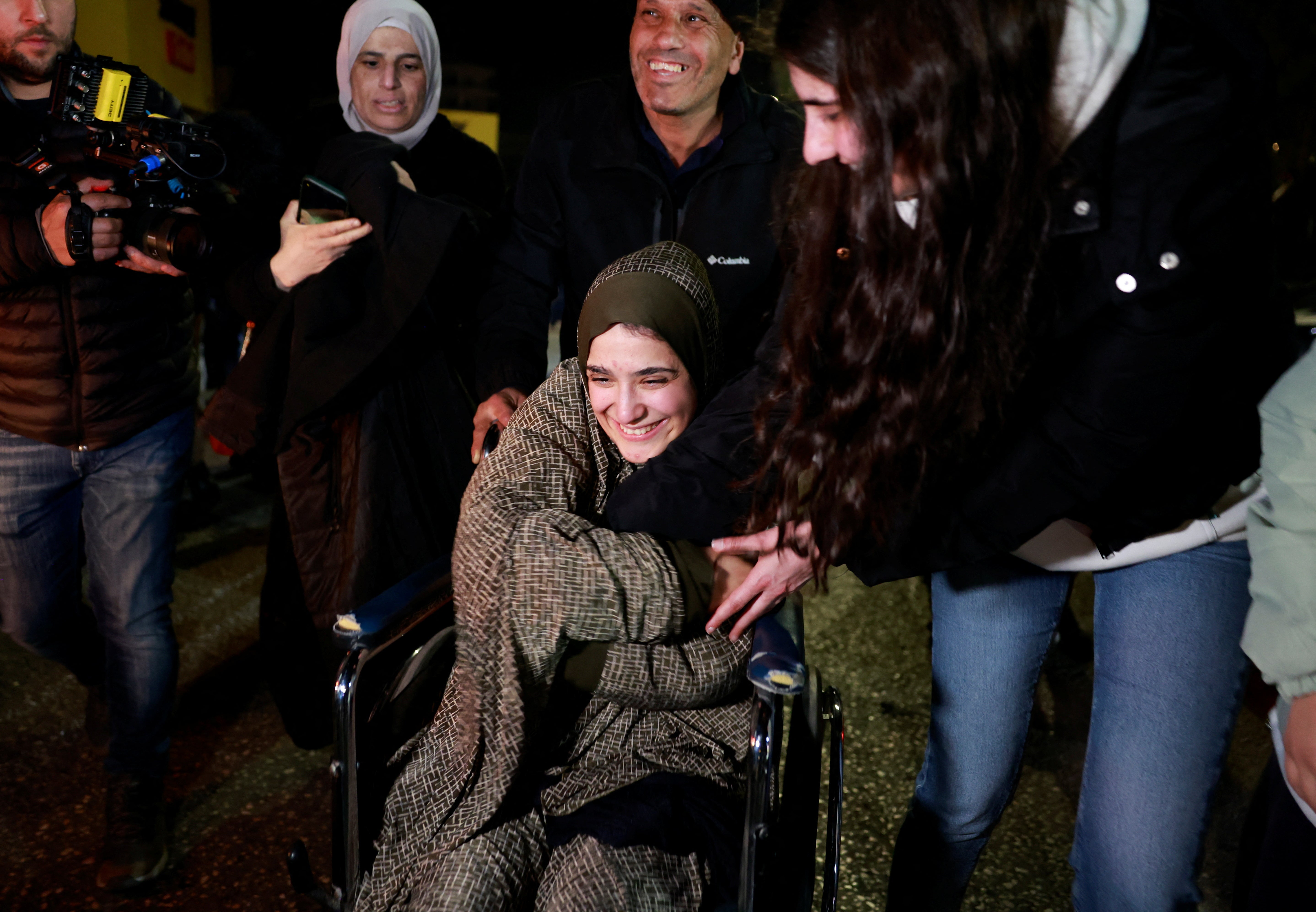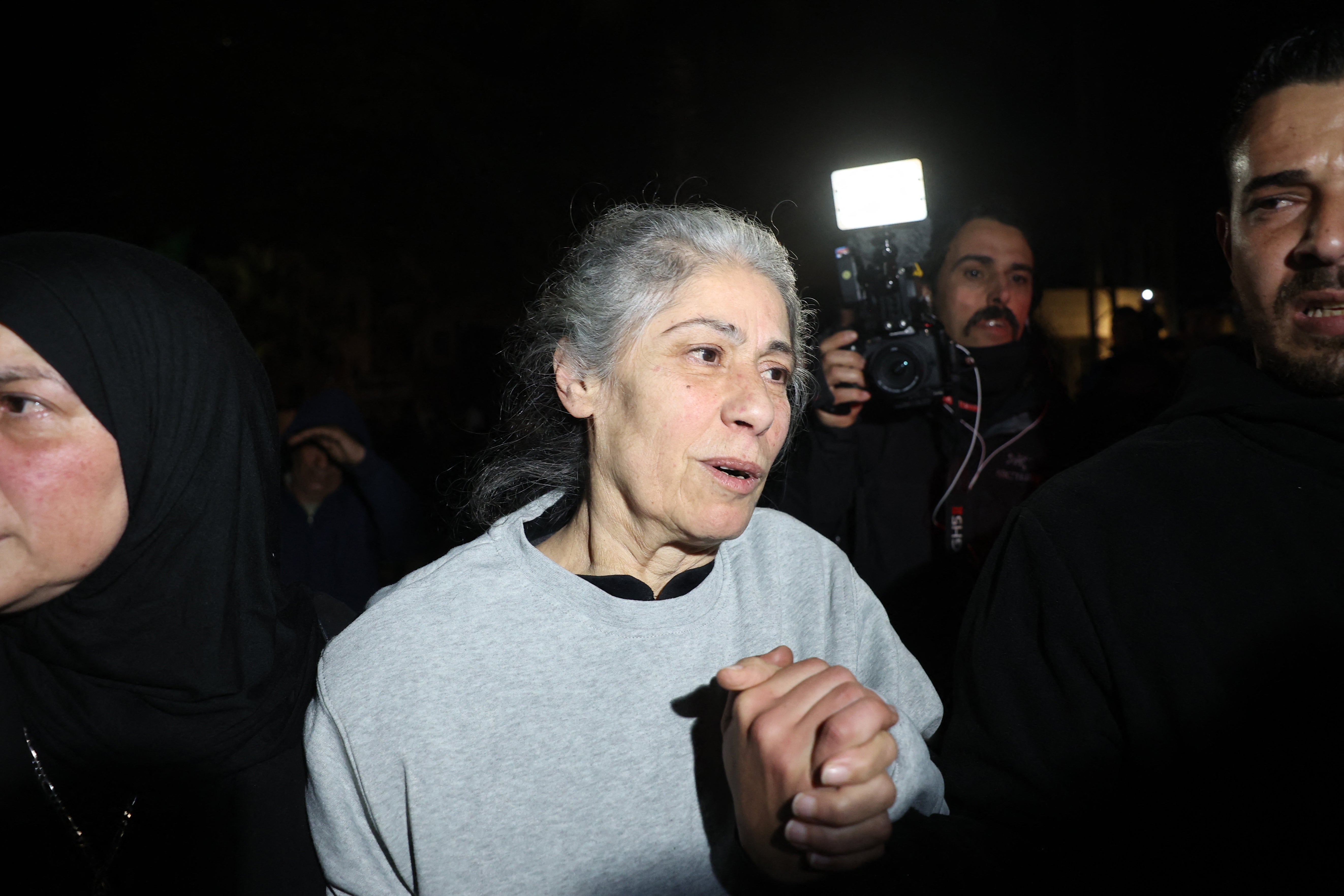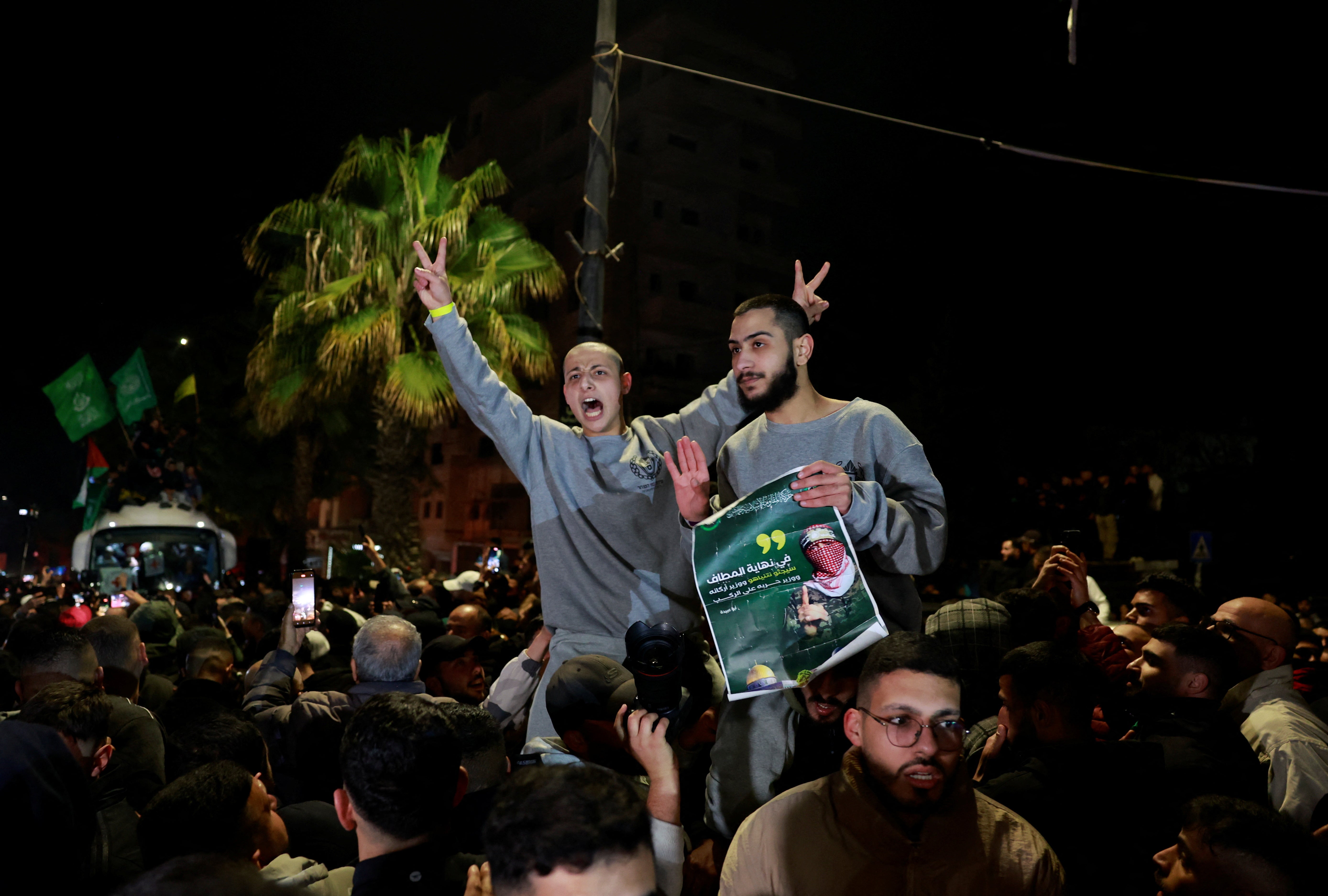Palestinian prisoners released during Gaza’s ceasefire deal have alleged abuse inside Israel’s jails – saying they feel “mixed” emotions about being freed as they fear the fragile truce will not hold and that they may be arrested again.
Ecstatic crowds waving flags greeted the buses that left the sprawling Ofer prison complex in the occupied West Bank early on Monday. Inside were 90 Palestinian prisoners, all women, teenagers and children, many of whom say they were abused and tortured inside Israel’s detention system – allegations that Israel has repeatedly denied.
They were freed as part of a long-fought-for ceasefire brokered by the US, Qatar and Egypt. The initial six-week period of the three-phase ceasefire will see Hamas release 33 hostages it seized during its bloody attacks on 7 October. In exchange, almost 2,000 Palestinians in Israeli detention are also set to be freed.
After 15 months inside Gaza, the first three hostages, including British-Israeli citizen Emily Damari, 28, were reunited with their families in emotional scenes at Tel Aviv’s central hospital on Sunday. It took until early Monday morning before the prisoners were released, after scuffles with Israeli security forces outside Ofer.
Among the released was 17-year-old secondary school student Thaer Abu Sara, who was arrested in the occupied West Bank in October 2023 – the second day of the war – on charges of participating in violent protests and allegedly having ties to Hamas. He says he was tortured in detention, including the use of electric shocks.
His family told The Independent that Israelis had barred them from holding celebrations or gatherings for the release of their teenager, and that they feared that any visitors who did come could be used as an excuse to arrest him again.
“The situation in the prison was very hard. They beat us every day, didn’t feed us, saying: ‘You are security prisoners; you don’t deserve to eat,’” Thaer recounted. “I was beaten brutally, and during the interrogation electric shocks were used in different areas of my body.”

“I was affected by scabies, and they didn’t give me treatment for six months. I still have scars,” he added.
The Independent asked the Israeli Prison Service (IPS) for comment on the allegations of torture. It said: “IPS is a law enforcement organisation that operates according to the provisions of the law.”
“All prisoners are detained according to the law. All basic rights required are fully applied by professionally trained prison guards. We are not aware of the claims you described and as far as we know, no such events have occurred under IPS responsibility. Nonetheless, prisoners and detainees have the right to file a complaint that will be fully examined and addressed by official authorities.”
Thaer Abu Sara’s older brother, Naim, said the family were deeply concerned about his wellbeing and now fear he might be re-arrested: they have been told that no celebrations, flags, or gatherings were permitted upon his release, and no one was allowed to visit their house or distribute sweets.
“What concerns us these days is that the police may decide to invade the house again, claiming people are coming to congratulate him. We cross our fingers not to have this situation,” Naim said. “Our main goal now is to help Thaer to continue his studies.”
Israel said the people on the list to be released were arrested for offences related to Israel’s security, from throwing stones to more serious accusations like attempted murder. The Independent understands that of the 90 released, 31 were in administrative detention, meaning they were held indefinitely without charge, trial, or even access to the charges against them – a practice that Israel says is vital for security, though it has been widely condemned by rights groups and UN experts.

The most prominent administrative detainee to be freed was Khalida Jarrar, 61, a member of the Palestinian Legislative Council and a leading figure in the Popular Front for the Liberation of Palestine, a secular leftist faction that was involved in attacks against Israel in the 1970s but has since scaled back its militant activities. From the time of her arrest in late 2023, she had been held under indefinite administrative detention.
“There’s this double feeling we’re living in: on the one hand, this feeling of freedom, for which we thank everyone, and on the other hand, this pain, of losing so many Palestinian martyrs,” she told Associated Press, looking frail.
Among those released were teachers, students and journalists, including Rula Hassanein, an editor for the Ramallah-based Wattan Media Network who was arrested last March and brought before a military court on charges of incitement on social media. The Committee to Protect Journalists has campaigned for her release on humanitarian grounds: Hassanein has a daughter, Elia, who was born prematurely and whose health declined after her mother was arrested as she was exclusively breastfed.
Shatha Jarrar, 24, a biology and chemistry student who was arrested in August on incitement charges for writing on her Facebook page, was also among those released. She alleged she was badly treated in prison and told The Independent that guards prevented her from taking medicine for insulin resistance.
She said she still has scars on her wrists from the handcuffs. “They put me in a prison cell with a camera on the toilet and another camera in the rest of the cell for three days. So I decided not to eat or drink because I couldn’t use the toilet that was filmed by them. They refused to provide [for my] health needs,” she told The Independent.

“I witnessed many repressions, where the guards brutally took the girls out of the cells, put them on the ground, heads down, hands cuffed, and insulted them. All of this was filmed by them.”
Shatha’s father, Nawaf Jarrar, 63, told The Independent that his daughter was jailed for “expressing an opinion” and that he has two sons who remain behind bars – one who was arrested the same day as Shatha, and another who has been in administrative detention for a year.
“The entire Palestinian people are prisoners,” he told The Independent. “Our message to the world is that we are people who want to live in peace.”
Seventeen-year-old Thaer said he just wants to continue his life now. “I don’t like to remember those days. I want to continue my studies, and I look forward to my future, and maybe even to study abroad,” he said.
Families waiting for their loved ones to be released in the next few weeks described feeling “mixed” emotions. Samira Hussein Hamad, 61 whose son Raed Al-Hajj Hamad is on the list of upcoming releases, said she felt “pain, sadness and joy”. Hamad was arrested in 2004 at age 21 and sentenced to 20 years in prison, a jail term he completed last January but he has not been released because of the war.
“It is an indescribable feeling that he will finally be among us and we will meet him after 20 years and four months,” she told The Independent.







